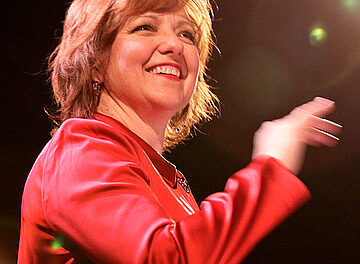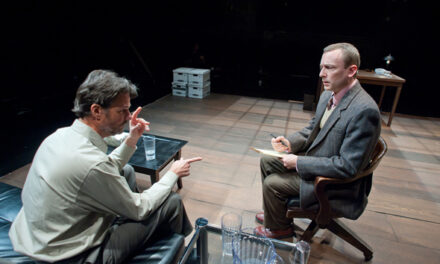Like many people, I first encountered Susan Sandler’s Crossing Delancey via its 1988 film version, directed by Joan Micklin Silver and starring the vastly underrated Amy Irving. At the time it seemed to me a sort of Jewish edition of Moonstruck: as pleasant, but more predictable. It was, however, redeemed by a few ethnic wrinkles, some delightful songs by the Roches, and its actors’ performances — in particular a marvelous one by the great Yiddish theatre actress Reizl Bozyk as Irving’s benignly meddling bubbie (grandmother).
The current production of Sandler’s 1985 romantic comedy by a new company, 2nd Avenue South (at the North Raleigh Arts and Creative Theater in Greystone Village Shopping Center) confirms that the movie’s weaknesses are inherent in the original stage script, which is in some ways superior to the film and in others, more deficient. If one were in a punning mood, it could be said that the play is neither gefilte fish nor fowl.
In Crossing Delancey, the essential conflict is that of tradition vs. modernity. The independent Isabelle (“Izzy”) Grossman yearns for the attentions of the egocentric novelist Tyler Moss even as her beloved bubbie Ida and the neighborhood shadkhn (matchmaker) Hannah connive to set her up with the eligible East Side pickleman Sam Posner. The basic structural problem is that, once Izzy is sent a fedora by her charming mensch of a suitor, we know what her ultimate choice will be; we’re ahead of the playwright, and that’s seldom a good thing.
The pleasures of Sandler’s gentle comedy lie in her obvious love for, and respect toward, her characters. Izzy’s resistance to tradition is never shrill or off-putting, and her innate strength of character remains intact even as the play slides toward its predetermined conclusion. Similarly, the bubbie is a role of such spirit and life that she transcends the inclination of such figures to become merely amusingly accented nudzhes. Sandler is less successful with Sam, who emerges as just a bit too good to be true. But the playwright doesn’t overplay her hand; the ending, despite its predictability, is more hopeful than decisive.
The show’s director, Al Singer, clearly loves these characters. His production is swift, amusing, and pulsates with life observed through understanding and empathy despite some correctable glitches. My primary objection to Singer’s staging is his unrelieved use of blackouts between sequences. It seems to me that, despite the snug confines of the performing space, these passages could be more effectively and efficiently achieved through the use of cross-fades.
Rebecca Blum, her characterization slightly hampered by a trace of Southern accent, makes a memorable Izzy. She has moments of comic inspiration that solidify our affection, as when she reads her feelings for the novelist Tyler from cue cards during a telephone conversation. And her smirk of disbelieving acidity when she realizes what Moss REALLY wants from her is absolutely perfect. If her ultimate embrace of her own ethnic tradition seems rushed, the fault is not that of the actor, but the playwright.
As the bubbie, the courageous Sylvia Dante, who was the only saving grace of a recent, literally emasculated production of Lost in Yonkers, struggled with problems of memorization during the show’s opening weekend, but her performance is otherwise utterly joyous. Although too young for the role (Ida is 80), Dante’s characterization is one of enormous richness, filled to overflowing with love and wit.
As the rampaging egotist Tyler Moss (“The only thing I do routinely is breathe“), David Klionsky plays the character’s smarminess lightly, never pitching his performance into caricature. Naomi Eckhaus provides a robust Hannah, her traditionalism perfectly balanced her own sense of modernity. The evening’s greatest asset, however, is the Sam of Seth Blum. Sweet and appealing, completely relaxed in his sense of self, Blum makes Sam so endearingly poised that we may not notice how alarmingly passive his character is.
The show’s lighting designer Bobby Cloutier adds a touch of randy humor in her red-lit fantasy sequence, and the prop designer Amy Bartley works small wonders within imposed limits: the walls of the bubbie‘s apartment are nicely festooned with old photographs, while Izzy’s bookshop is neatly conveyed through the use of bookcases and a display of some cleverly-designed copies of Tyler Moss’s novels.
A final note to reluctant goyim: the production’s program contains a useful glossary for the Yiddish-impaired.
2nd Avenue South presents Crossing Delancey Friday-Saturday, Sept. 5-6, at 8 p.m.; Sunday, Sept. 7, at 3 p.m.; Friday-Saturday, Sept. 12-13, at 8 p.m.; and Sunday, Sept. 14, at 3 p.m. at the North Raleigh Arts and Creative Theater, Greystone Village Shopping Center, at the intersection of Leadmine Rd. and Saw Mill Rd., Raleigh, North Carolina. $15 ($10 seniors). 919/233 0752.













